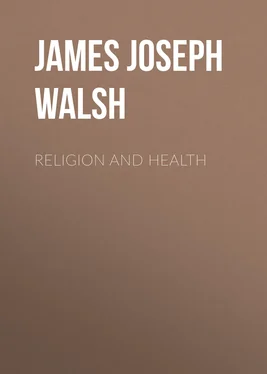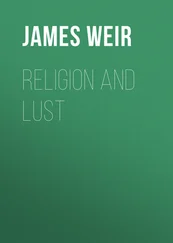James Walsh - Religion And Health
Здесь есть возможность читать онлайн «James Walsh - Religion And Health» — ознакомительный отрывок электронной книги совершенно бесплатно, а после прочтения отрывка купить полную версию. В некоторых случаях можно слушать аудио, скачать через торрент в формате fb2 и присутствует краткое содержание. Жанр: foreign_prose, foreign_religion, Здоровье, foreign_antique, на английском языке. Описание произведения, (предисловие) а так же отзывы посетителей доступны на портале библиотеки ЛибКат.
- Название:Religion And Health
- Автор:
- Жанр:
- Год:неизвестен
- ISBN:нет данных
- Рейтинг книги:4 / 5. Голосов: 1
-
Избранное:Добавить в избранное
- Отзывы:
-
Ваша оценка:
- 80
- 1
- 2
- 3
- 4
- 5
Religion And Health: краткое содержание, описание и аннотация
Предлагаем к чтению аннотацию, описание, краткое содержание или предисловие (зависит от того, что написал сам автор книги «Religion And Health»). Если вы не нашли необходимую информацию о книге — напишите в комментариях, мы постараемся отыскать её.
Religion And Health — читать онлайн ознакомительный отрывок
Ниже представлен текст книги, разбитый по страницам. Система сохранения места последней прочитанной страницы, позволяет с удобством читать онлайн бесплатно книгу «Religion And Health», без необходимости каждый раз заново искать на чём Вы остановились. Поставьте закладку, и сможете в любой момент перейти на страницу, на которой закончили чтение.
Интервал:
Закладка:
James J. Walsh
Religion And Health
INTRODUCTION
Physicians are agreed that there is no entirely satisfactory definition for health. We all know quite well what we mean when we use the word, but it does not admit of such exact limitations as would make a scientific formulation of its meaning. Religion is another of the words which, in spite of its common use, is extremely difficult to define exactly, and it has often been said that we have no definition that will satisfy all those who profess religion and certainly not all those who have made a study of it from the standpoint of the science of theology. As is true of health, each of us knows pretty thoroughly what we mean when we use the word, though our definitely formulated signification for it might not meet with the approval of others, especially of those who are exacting in their requirements. With the two principal words in the title incapable of exact definition, it might seem that the subject matter of this book would be rather vague at best and unpromising in practical significance. But all this indefiniteness is in theory. There are no two words in the language that are more used than health and religion, none that are less vague in practice and no two subjects have a wider appeal or a more paramount interest. The linking them together for discussion in common because of their mutual influence will serve to throw light on both of them and undoubtedly help toward a better understanding of each.
Ordinarily the most satisfactory definition of a word can be obtained from its etymology. Unfortunately in the matter of religion there is a very old-time division of opinion as to the derivation of the word which makes etymology of less definite significance than usual. Cicero suggested that religio came from relegere , to go through or over again in reading, speech or thought, as prayers and religious observances generally are repeated. On the other hand St. Augustine and Lactantius insisted on deriving religio from the Latin verb religare , which means to bind again, to bind back, to bind fast. The word obligation has an analogous origin and illustrates the meaning of religion as if its form from etymology should have been religation.
It is this latter derivation that has been most commonly accepted in the modern time. A man may recognize the existence of God and yet not feel any particular obligations toward Him, but if he binds himself anew to the deity whom he recognizes, by trying to make his life accord with the divine will as he views it, then he practices religion. James Martineau said, "By religion I understand the belief and worship of Supreme Mind and Will, directing the universe and holding moral relations with human life."
What will occupy us in this book is the effect of this profound feeling and sense of obligation toward a higher power on health, that is, on that wholeness of body and mind which constitutes a normal condition for human beings.
There are many more relations between the two words than would at first be suspected or that most people might think possible. The old high German word haelu or haelo , from which our word health is derived, meant also salvation. The original root hal means haleness or wholeness and also refers to healing, and curiously enough the word holiness is derived from the same root. Holiness has now come to refer to perfection, or at least normality of soul, while health refers to normality of body. Our word health is related more directly to whole than it is to heal, in spite of the feeling there might be because of the spelling that the latter word must represent its immediate origin. Holiness of soul exactly corresponds in etymology with wholeness of body.
Cardinal Newman would, I suppose, be an authority on the subject of religion as satisfying for most people as could be found. In his "Grammar of Assent", which he wrote in order to define as exactly as might be possible just how men came to admit certain propositions with special reference to the acceptance of religion, he gave a definition of what he meant by the word in as simple words as it is possible to use, perhaps, to express so large a subject. He said: "By religion I mean the knowledge of God, of His Will, and of our duties toward Him." Matthew Arnold, who represents among English-speaking peoples almost the opposite pole of thought to Cardinal Newman, in what concerns religion, suggested in "Literature and Dogma" that "Religion, if we follow the intention of human thought and human language in the use of the word, is ethics heightened, enkindled, lit up by feeling; the passage from morality to religion is made when to morality is applied emotion." Both of these men, in spite of their distance apart, insist on duty as the essence of religion. Matthew Arnold calls it ethics and says nothing as to the foundation of it; the great English Cardinal speaks very simply of our duties toward God. Newman says nothing of the emotions but appeals only to the reason, while, curiously enough, the rationalizer in religion emphasizes the emotions.
Between these two definitions there is a world of difference that we shall not attempt to bridge, for we want to treat of the relations and above all the interaction of religion and health in the widest sense of these terms. The "Century Dictionary" definition more nearly resembles that of Cardinal Newman than Matthew Arnold's formula, but it generalizes in a way that would describe the practice of religion for a greater number of people and especially for those who still believe that there are more gods than one. It runs: "Recognition of and allegiance in manner of life to a superhuman power or superhuman powers, to whom allegiance and service are regarded as justly due."
Even this definition is not too broad for the subject matter of this book, for I am one of those who believe that there is a blessing on every sincere effort of worship of the Higher Power, no matter how groping it may be. Above all, every regulation of life with reference to a power above us felt to have a Providence over the world in which we live has an almost inevitable reaction on health and will lead to better things. The sincere pursuit of good conduct as an end in life under a Providence that is recognized will almost necessarily lead to better knowledge of our relations to the higher powers, and also of our relations to ourselves and the world around us.
With these preliminaries we are ready to consider religion and health and their mutual influence, but the inevitable question that suggests itself is, "Is religion a living force in our time? Has not science given it its death blow? While it walks the earth as yet, is it not only as the ghost of an outworn phase of human interest? Is it any more than merely a superstition in the sense once suggested as the etymology of this word by James Russell Lowell as if derived from superstes , a survivor, representing, as all superstitions do, a survival from a previous state of thinking, the reasons for which have disappeared, though the mental inertia of human beings still keeps them in vogue?" A good many people in our time, including not a few of those who are rather prone to consider themselves above the rest of the world, have not hesitated to express the view that it is only old fogies and especially those ignorant of modern science who continue to think that religion can still be taken seriously. Some few of them have the best of good will in the world and appreciate how much of benefit was derived from religious belief, benefit which they confess did good both for the mind and the body of man; and they are even ready to express sorrow that it has outlived its usefulness, but they feel that they must insist that religion is now only the wraith of its former self, a misty congeries of old-fashioned beliefs which the ignorant alone reverence, accepting it very much as they do ghost stories in general.
Читать дальшеИнтервал:
Закладка:
Похожие книги на «Religion And Health»
Представляем Вашему вниманию похожие книги на «Religion And Health» списком для выбора. Мы отобрали схожую по названию и смыслу литературу в надежде предоставить читателям больше вариантов отыскать новые, интересные, ещё непрочитанные произведения.
Обсуждение, отзывы о книге «Religion And Health» и просто собственные мнения читателей. Оставьте ваши комментарии, напишите, что Вы думаете о произведении, его смысле или главных героях. Укажите что конкретно понравилось, а что нет, и почему Вы так считаете.












